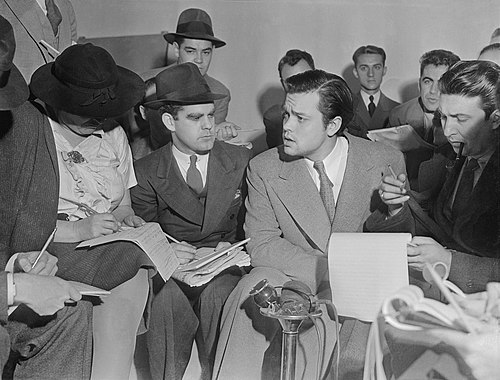User:Nirajrm
Appearance
| This is a Wikipedia user page. This is not an encyclopedia article or the talk page for an encyclopedia article. If you find this page on any site other than Wikipedia, you are viewing a mirror site. Be aware that the page may be outdated and that the user whom this page is about may have no personal affiliation with any site other than Wikipedia. The original page is located at https://en.wikipedia.org/wiki/User:Nirajrm. |
6,733 Featured Articles as of today.
Orson Welles (May 6, 1915 – October 10, 1985) was an American actor, director, screenwriter, and producer who is remembered for his innovative work in film, radio, and theatre. After various theatre roles in Ireland, England and the United States as well as acting on radio shows, Welles began directing stage productions for the Federal Theatre Project at the age of 21. These included the Voodoo Macbeth (1936) and The Cradle Will Rock (1937). His first film was Citizen Kane (1941), which he co-wrote, produced, directed and starred in as the title character, Charles Foster Kane. It has been consistently ranked as one of the greatest films ever made. Welles directed twelve other features, including The Magnificent Ambersons (1942), The Lady from Shanghai (1947), Othello (1951), Touch of Evil (1958), The Trial (1962), Chimes at Midnight (1966), and F for Fake (1973). Welles's distinctive directorial style featured layered and nonlinear narrative forms, dramatic lighting, unusual camera angles, sound techniques borrowed from radio, deep focus shots and long takes. He received an Academy Award and three Grammy Awards, among other honors. This photograph, taken in 1938, shows Welles surrounded by reporters and discussing his radio drama "The War of the Worlds", which had induced panic among some listeners who believed that a real Martian invasion was taking place.Photograph credit: Acme News Photos
"The game of chess is not merely an idle amusement; several very valuable qualities of the mind are to be acquired and strengthened by it, so as to become habits ready on all occasions; for life is a kind of chess." — American philosopher, scientist, and author Benjamin Franklin
|


